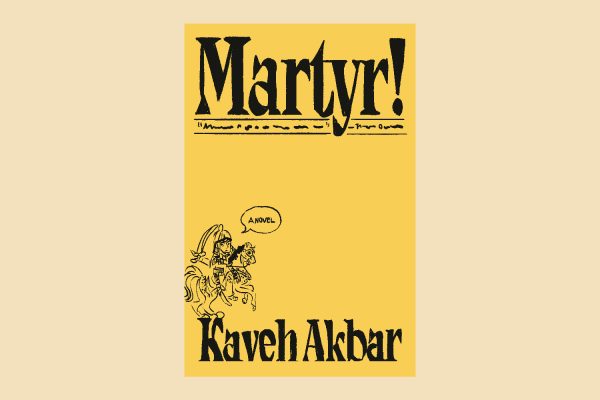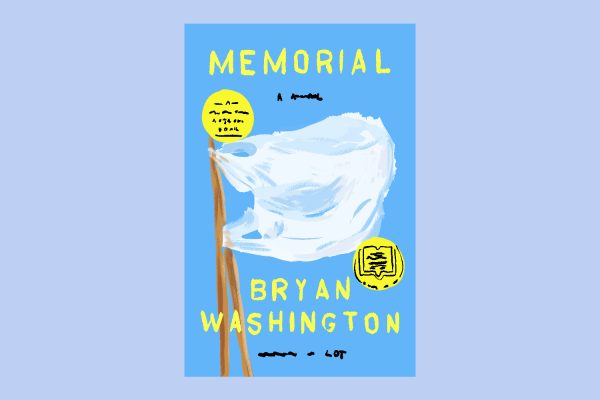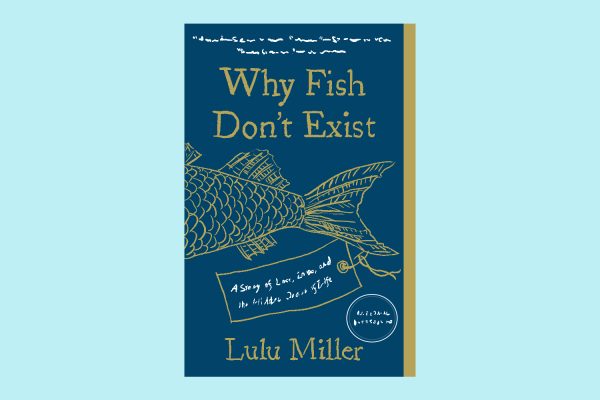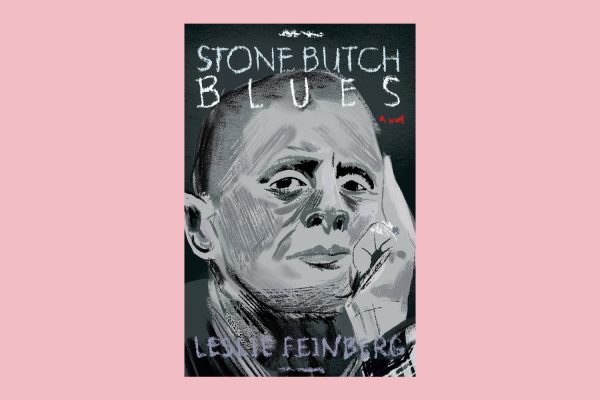“Martyr!” by Kaveh Akbar

“Martyr!” by Kaveh Akbar tells the story of Cyrus Shams, a first-generation Iranian immigrant struggling with sobriety and grief while living a miserable life in Indiana as a lackluster poet. When Cyrus was a young boy, his mother died in a plane crash after an Iranian commercial airliner was shot down by the U.S. military. After her death, Cyrus and his father immigrated to the United States with nearly no money. Soon after Cyrus starts college, his father dies, leaving him with no close family. He occasionally calls his uncle Arash, who lives in Iran, but Arash’s mental state is declining — likely from PTSD he developed after riding through Iranian battlefields on horseback, dressed as an angel of death, giving dying soldiers a last bit of hope during the Iran-Iraq war.
Over time, Cyrus becomes obsessed with death. But moreso, he becomes obsessed with making death mean something. Cyrus begins writing a book about martyrdom and travels to the Brooklyn Museum to see a performance art exhibition called “Death-Speak,” by dying artist Orkideh. The artist spends her last living days in the museum with patrons as she’s dying from terminal cancer. Cyrus returns each day to the museum to speak with Orkideh, discovering in the process that his own mother’s death was never what it seemed to be.
The book is a literary masterpiece, having even been longlisted for the 2024 National Book Award for Fiction, playing with form as it switches perspective between Cyrus and his family members in addition to excerpts from his manuscript on martyrdom. Cyrus’ angsty-poet ways are heart-touching and sensitive, while building a unique commentary on death, substance abuse and art. The novel is a beautiful portrait of a struggling young man attempting to find meaning in his life.
— Alexa Donovan, Arts Editor
“Memorial” by Bryan Washington

Bryan Washington’s “Memorial” chronicles the complicated romantic relationship between Japanese-American chef Mike and Black day care teacher Benson as they each reflect on their mutual infidelity, sometimes-violent arguments, fraught relationships with their homophobic fathers and struggles to feel at home.
The book opens as Mike casually mentions that he’s leaving Houston for Osaka the next day for an unspecified amount of time to care for his estranged father in his dying days. His announcement comes on the same day that his mother, Mitsuko, arrives at their house in Houston from Tokyo. Benson, who now has Mitsuko staying with him as a guest in Houston, is shocked by Mike’s sudden trip, but doesn’t question him. Mitsuko and Benson had never met, and the awkward circumstances of the couple’s separation force them to contemplate what it is that they want from one another, if anything at all.
The three-part narrative begins with Benson as he reckons with the complexities of his relationship with his own family, all while navigating his new life with Mitsuko and her casual racism. The second part is Mike’s candid rumination on home and his relationships — both familial and romantic — during his return to his hometown. It ends with Benson’s narration of Mike’s return to Houston and Mitsuko’s final days with them, as he considers his future. Washington wastes no words in his exploration of liminal spaces, whether physical or emotional. His prose is clean and honest, developing earnest characters who, despite their glaring flaws, are lovable.
Washington’s story of estrangement and its contemplation of what it means to make it back home is heartbreaking, witty and well worth your time.
— Tina Nejand, Deputy Managing Editor
“Why Fish Don’t Exist: A Story of Loss, Love and the Hidden Order of Life” by Lulu Miller

“That is our life’s work to mistrust our measures. Especially those about moral and mental standing. To remember that behind every ruler there is a Ruler. To remember that a category is at best, a proxy; at worst, a shackle.”
Lulu Miller’s half-biography, half-memoir “Why Fish Don’t Exist: A Story of Loss, Love and the Hidden Order of Life” weaves Miller’s own life story with that of famed taxonomist and brutal eugenicist David Starr Jordan. Miller searches for answers to her break-up-driven existentialism through the story of Jordan’s life. Jordan was a taxonomist who discovered thousands of species of fish, and Miller’s main interest in the scientist comes from his persistence in pursuing order in his life, even after the 1906 San Francisco earthquake ruined his collection of scientific specimens. Miller uses Jordan’s story as a launching pad for her own search for order in life, despite the hardship she has gone through. Readers are faced with anecdotal stories, scientific research and cold, hard truths that hit like a punch in the face.
I don’t normally read nonfiction, but I devoured this book. Miller divulges well-researched information about the history of taxonomy, the scientific field in the early 20th century and a period the United States wants us to forget: the eugenics movement. Miller’s engaging writing, which switches from a scholarly, professional tone to one you might find in the entry of a diary, gives a fresh perspective on what it means to be here and be human, right now.
— Hannah Marr, Contributing Writer
“Stone Butch Blues” by Leslie Feinberg

Content warning: This book contains scenes of sexual violence and police brutality.
From the first chapter, Leslie Feinberg’s words pull readers into a world that is as brutal as it is beautiful. “Stone Butch Blues” is a semi-autobiographical novel that follows the life of Jess Goldberg, a butch lesbian growing up in 1940s Buffalo. From a young age, Jess was a gender non-conformist, never enjoying acting or looking like a girl in the traditional sense. Struggling to live authentically in an environment that refuses to accept her, she eventually decides to run away.
Jess’ journey on the road explores the pain, violence and isolation experienced in a society that punishes those who they do not understand. The story follows Jess’ journey for acceptance against the turbulent backdrop of the civil rights, labor and LGBTQ+ movements. Through Jess’ experiences working in factory unions, gay bars and within activist circles, Feinberg interlocks oppression and the power of healing through organizing.
The unflinching portrayal of brutality and discrimination can be pretty heavy, but it honors the truth of the homophobia, heterosexism and transphobia that countless people went through, which often goes overlooked in our history books. Those moments are interspersed with raw descriptions of love and gentleness in Jess’s relationships throughout the book, highlighting how loving someone can be a radical act. Beyond just a novel, this book is a manifesto, a love letter and a history lesson.
Feinberg, a prominent figure in the LGBTQ+ community and a pioneer in gender studies, was committed to making her work accessible, so if you would like to read “Stone Butch Blues,” you can download a digital copy of the book for free.
— Mehr Kotval, Opinion Editor
Contact Alexa Donovan, Mehr Kotval, Hannah Marr and Tina Nejand at [email protected].

























































































































































